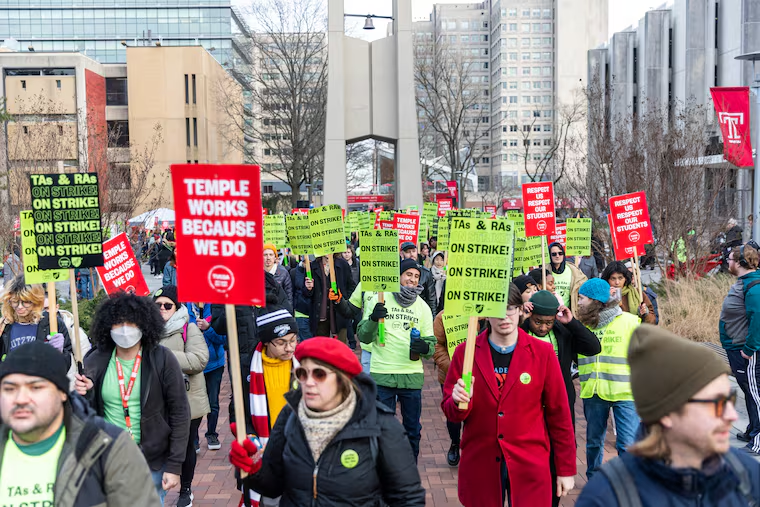How does Temple grad students’ pay compare to other schools?
At Temple, the average base pay for graduate teaching and research assistants is $19,500 a year. Many other schools have higher base pay.

As Temple University graduate students strike for better pay and health-care benefits, here’s a look at what some other colleges locally and nationally provide.
At Temple, the average base pay for graduate teaching and research assistants is $19,500 a year. The union is seeking a 50% increase, while the university is offering 3% increases over the four-year contract. The university fully pays for health insurance for graduate students, but students must pay for children and spouses if they want to be on the plan.
The list below includes a cross section of colleges, including private universities — two of them in the Ivy League — as well as state and state-related colleges.
» READ MORE: Striking grad students feel the toll of Temple’s tactics but remain steadfast
Other local colleges
University of Pennsylvania: The school last semester passed a nearly 25% increase in its minimum pay for doctoral students — the largest one-time boost in the school’s history. Starting in 2023-24, the minimum stipend will rise from $30,547 to $38,000. The university also pays for health-care coverage for the students, but not for dependents.
Princeton University: Thirteen months ago, the school announced a 25% increase in its doctoral student stipend rates, its largest one-time increase. Pay there went from $31,720 to $40,000. Princeton pays health-care insurance costs for the vast majority of its graduate student assistants and subsidizes a portion for eligible dependents. The students with children also are eligible to apply for awards up to $6,500 per child annually for childcare, housing, and health-care premiums.
Drexel University: The university said while pay varies by discipline and department, the majority of students receive a stipend of at least $30,000 for a 12-month appointment. (Temple’s students work nine months, so, prorated, Drexel’s pay would be equivalent to $22,500.) The university pays the health-care insurance cost for graduate students, but the students must pay if they want coverage for dependents.
Pennsylvania State University: Graduate assistants with 20-hour a week appointments, 36 weeks a year, earn an average of $24,822 annually. Penn State also pays about three-quarters of the health-care insurance premium for the dependents of their graduate student teaching and research assistants, compared to Temple, which pays none. However, Temple covers the full cost of health insurance for graduate students, while Penn State pays 80% of the premium.
Rutgers University: Teaching assistants and graduate assistants covered by the union contract get a minimum salary of $30,162. If their appointment is for the academic year, it rises to $33,999. Contractually they must work 15 hours a week. The graduate students must pay 10% of their premium for single coverage, 5% for family and 6% for spouse or child coverage.
West Chester University: Graduate students get paid $2,500 per semester or $5,000 for the academic year. The university does not pay health insurance costs of the students or their dependents. West Chester officials note that, unlike Temple and Penn State, the school is not designated as a Research 1 university; its graduate assistants are in masters’ programs and under the union contract can’t teach classes on their own. The school, however, is looking at the pay structure for graduate students.
And elsewhere
University of California: Graduate student teaching assistants went on strike for six weeks last year. The strike ended just before Christmas. Within 90 days of the ratification of the contract, students were due to receive between 7.5% to 9% raises and in October, additional raises ranging from 16.5% to 32.7%. By Oct. 1, 2024, the minimum nine-month salary for teaching assistants will rise to $34,000 at most campuses. At UC Berkeley, UCLA, and UCSF, it will rise to $36,500. Raises for student research assistants were 10% in year one and 6.5% in subsequent years, increasing their pay to $34,564 by Oct. 1, 2024. The university also pays health insurance costs for students and their children if they don’t qualify for state-provided insurance.
Yale University: In April, the university announced increases for 2022-23 of 14% in the humanities and social sciences for a base stipend of $38,300, and 5% in the physical sciences and engineering for a base of $38,600, and $40,000 in the biological sciences.
Duke University: In September, Duke said it would give students a one-time $1,000 payment in October and an 11.4% increase in its stipend for 2023-24, bringing it to $34,660.